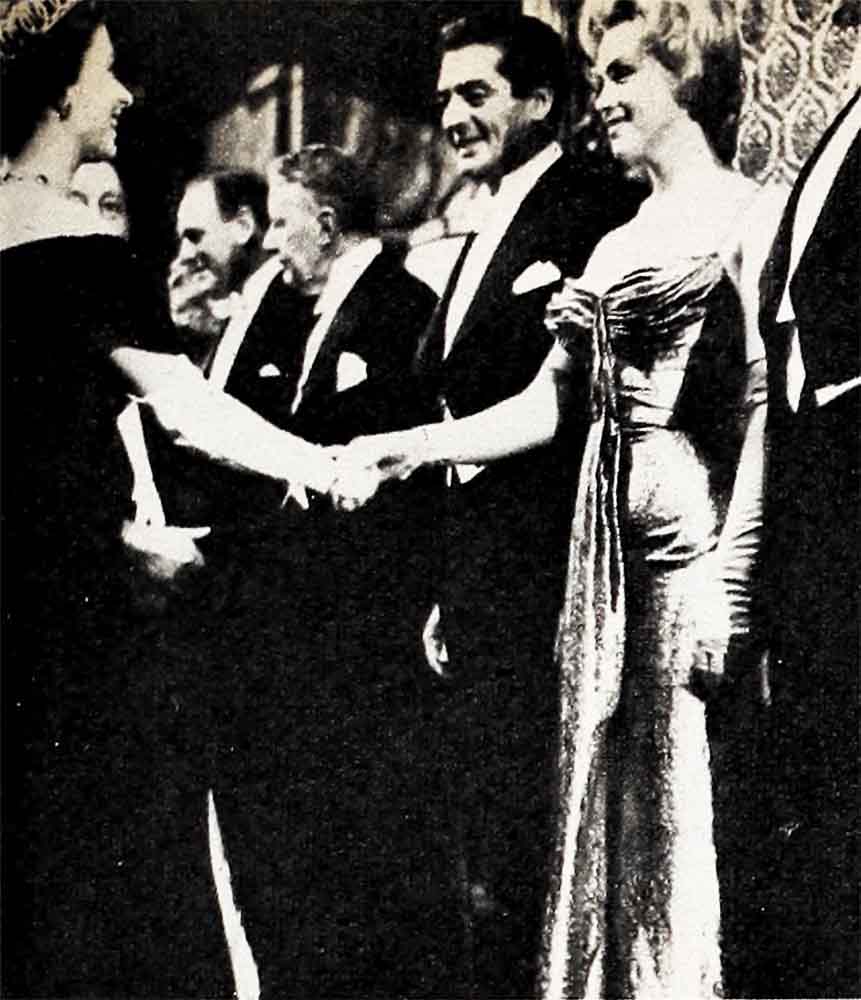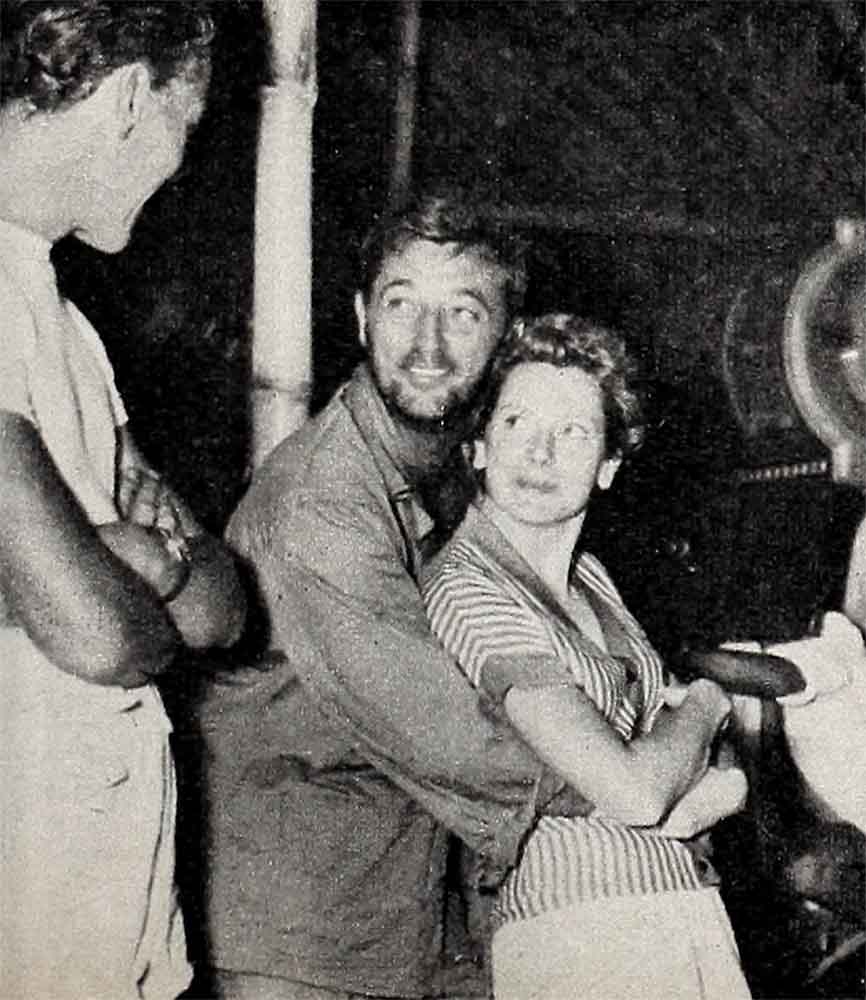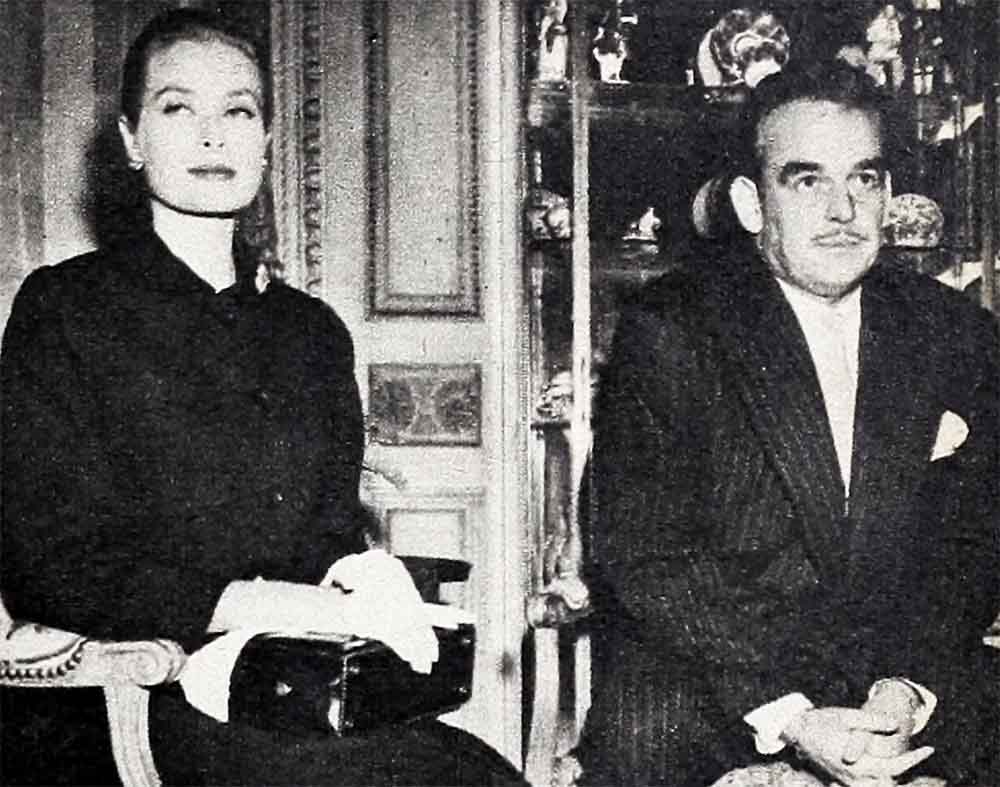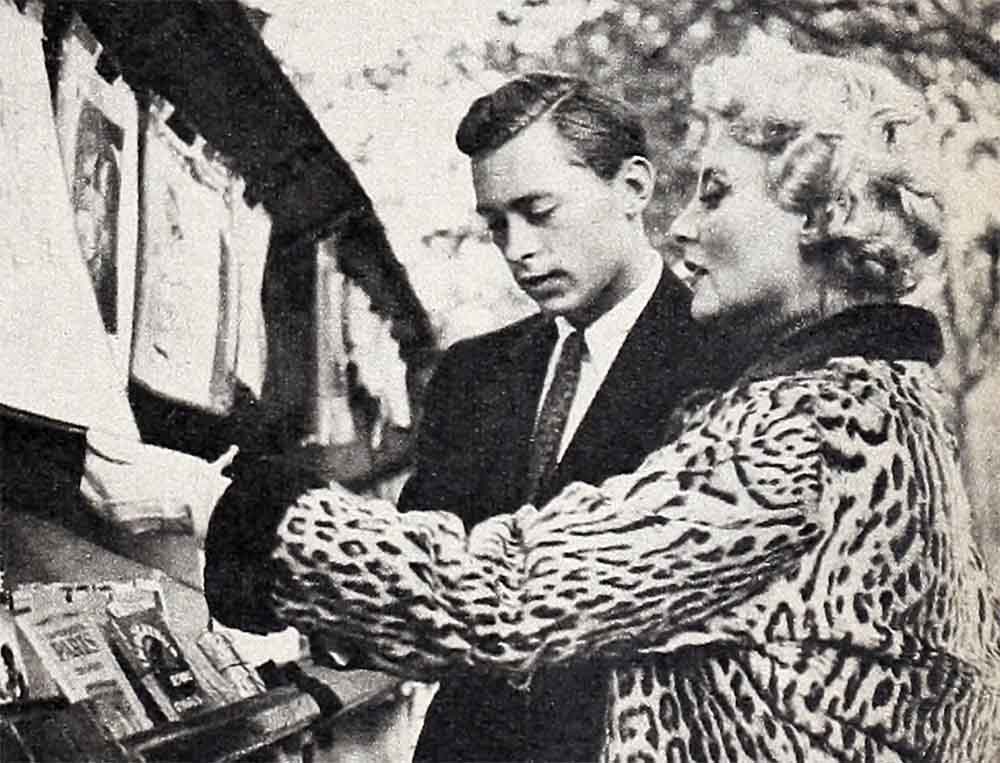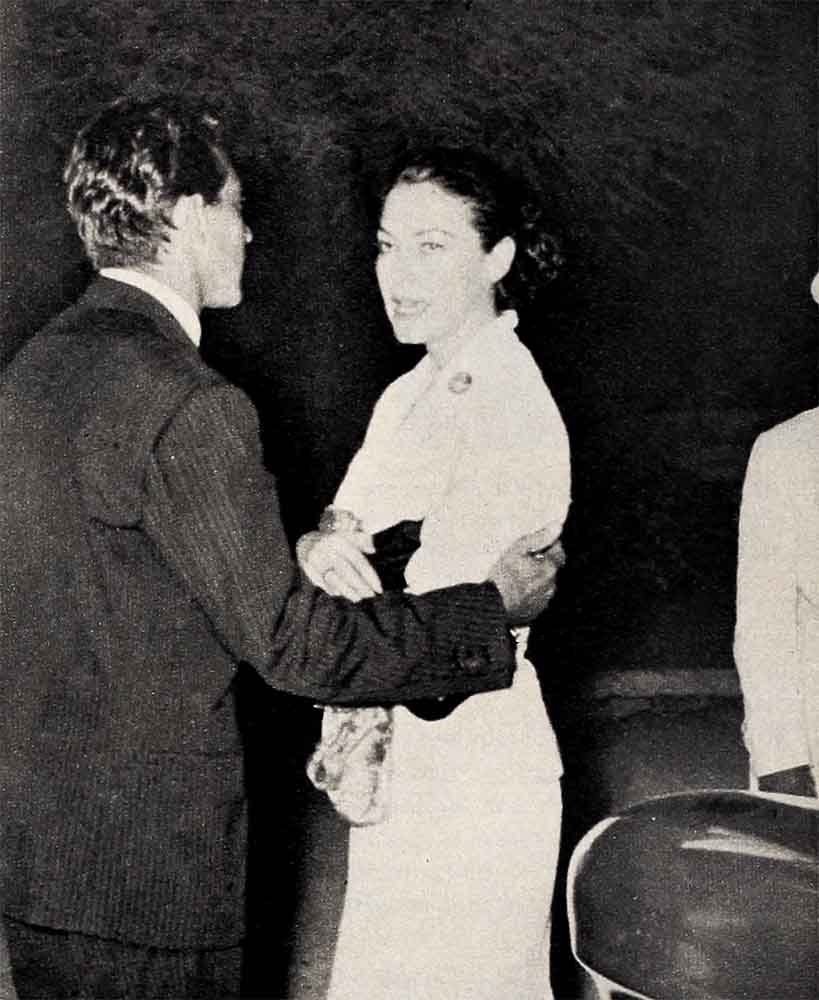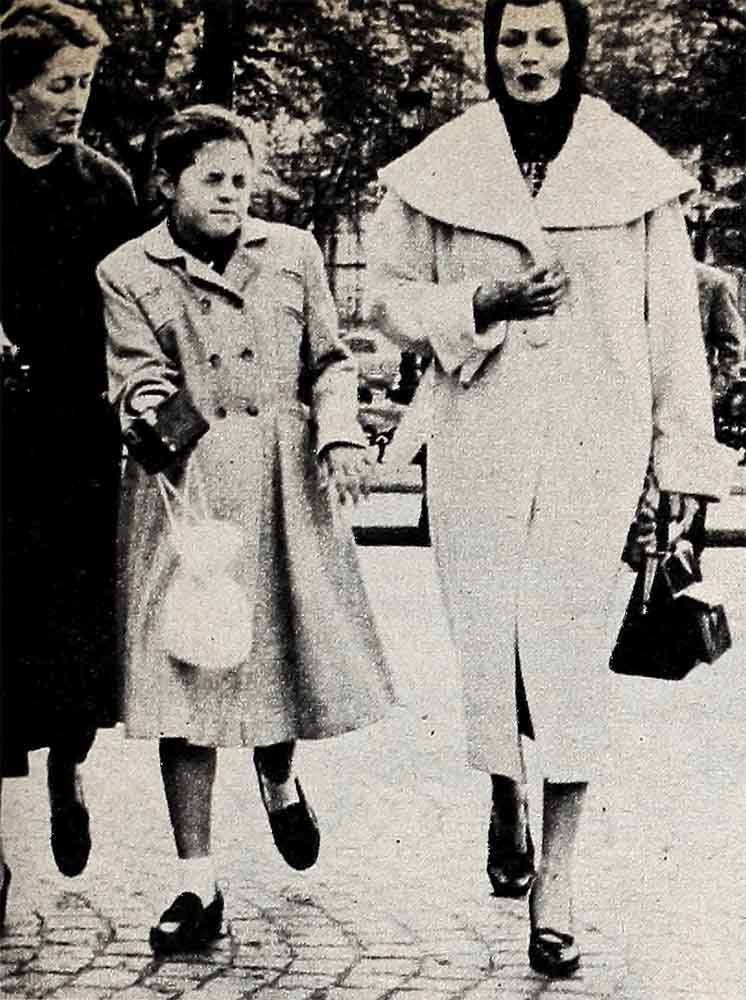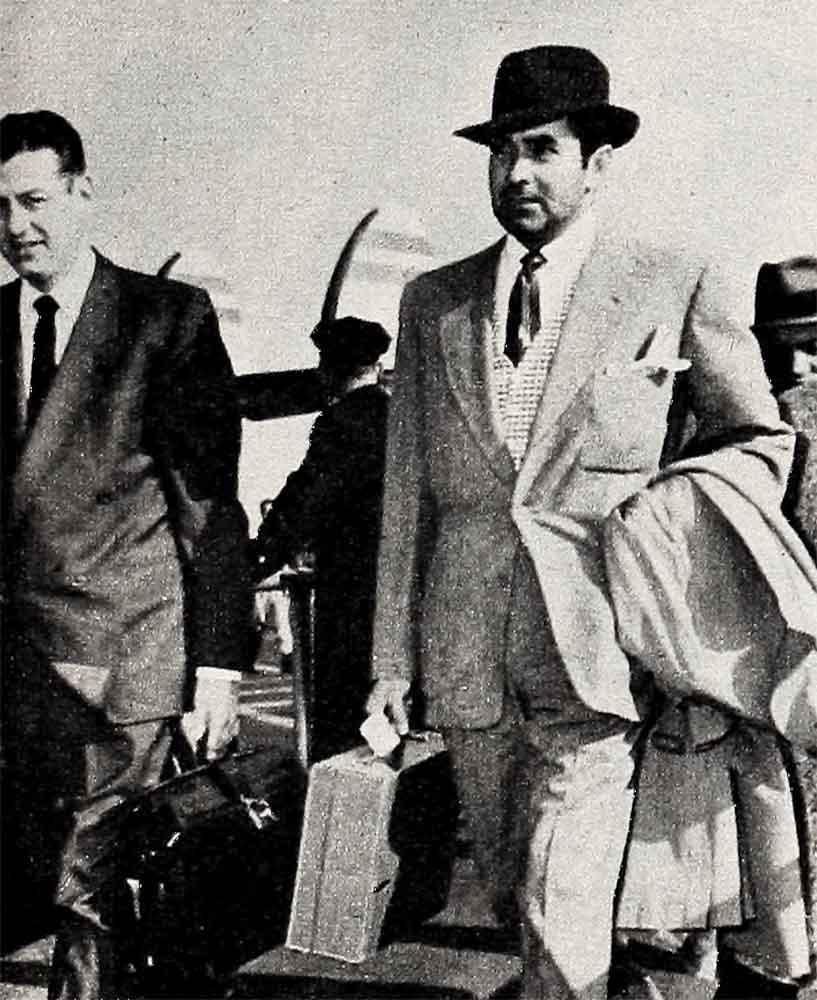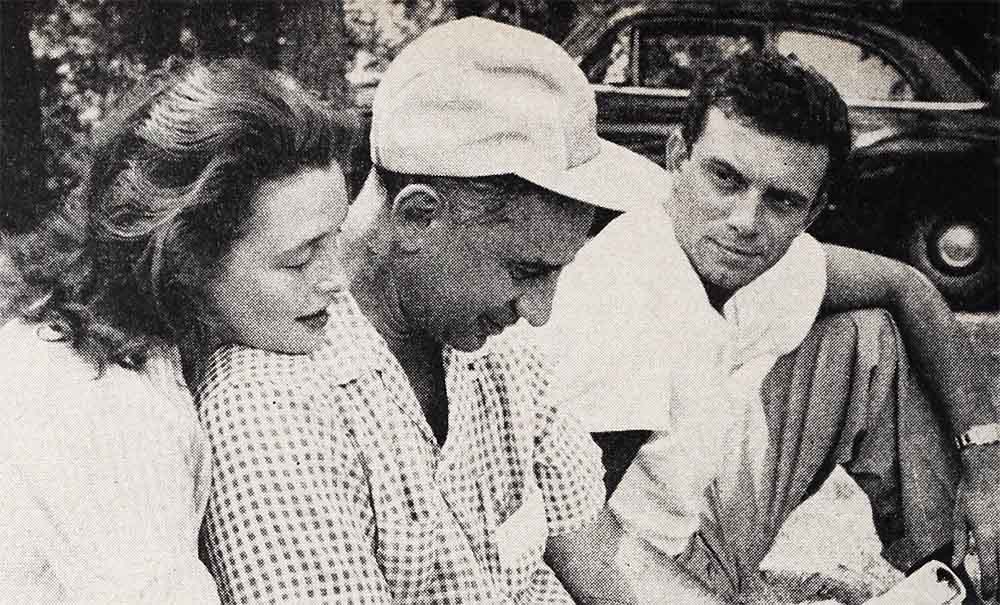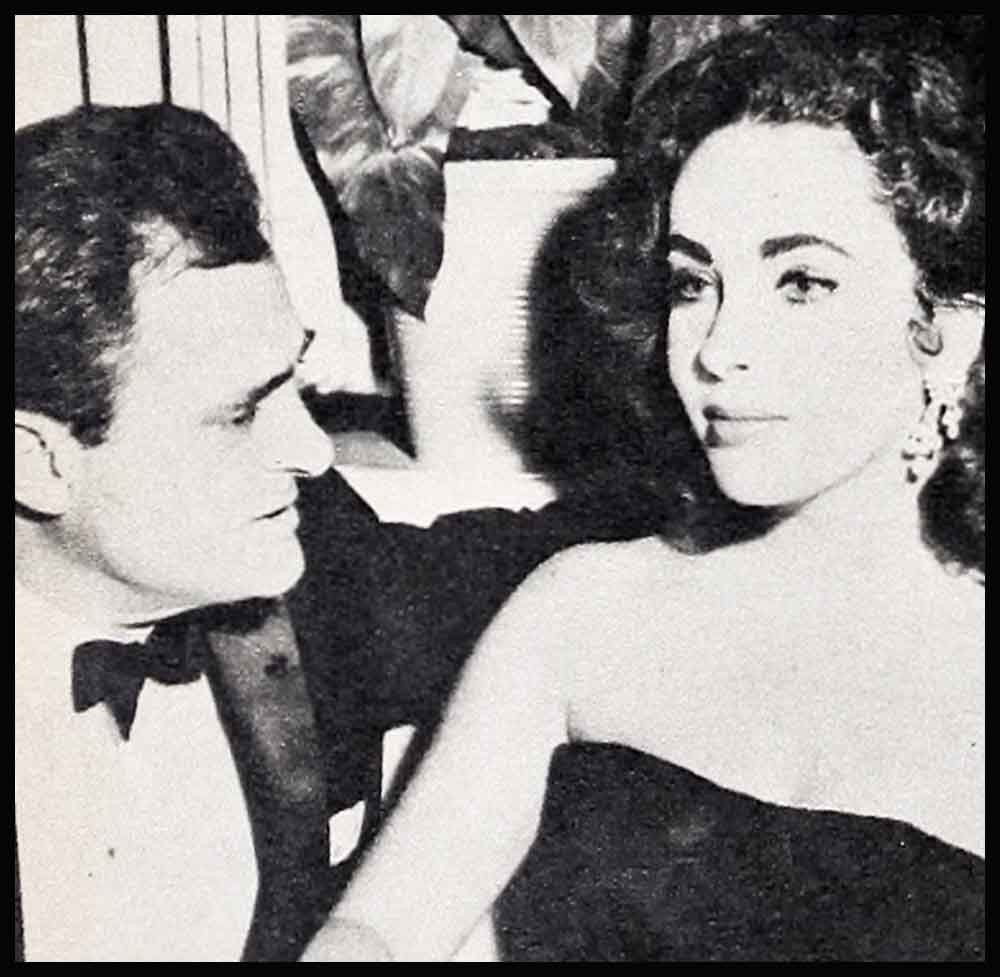
Exclusively Yours
If Elizabeth Taylor had been born in the time of Louis the Fourteenth she’d have felt right at home among the royal splendors and even more royal extravagances of that glorious king. That’s one reason I wasn’t as surprised as most people when Liz flipped over Mike Todd. Mike may not look like a king, but he certainly spends like one. And Liz was born to be the pampered darling of a daring adventurer—which he is—with all Mike’s reckless extravagance. But it was the fact that she has always been a “pampered darling” that precipitated their first quarrel. Liz may wear Mike’s 30-carat engagement ring, but he wears the pants! It was this realization, that her future husband would brook no nonsense, that prompted their first serious disagreement and made her stop her impulsive desire to dash off to Mexico for a quick divorce. Instead, she decided to file in California, which gives her a whole year to contemplate a future with—or without—this fabulous man as Husband Number Three.
But knowing Mike, I know two things: he’s a reckless, impatient sort of man who wants what he wants when he wants it— and usually winds up getting it. If he has to wait a year for Liz, I don’t think there will be a marriage. However, Liz will find this generous, dynamic guy a hard man to get over. For instance, Liz and Mike were dining at the Colony in New York when Liz, who adores jewelry, happened to admire a beautiful bracelet in the Van Cleef and Arpels window, on display in the lobby of the restaurant. Mike immediately dispatched someone for the key to the window, had it opened, wrote out a check for $2500 and presented the bracelet to Liz then and there! Quite a contrast to quiet, unemotional Mike Wilding and his modest gifts!
My European correspondent tells me that everyone on the far side of the Atlantic is insisting that Marilyn Monroe is pregnant. Her personal opinion, my friend cables, after sifting all the rumors and this-a and that-a, is that MM is enceinte, but she adds, “Remember, this is only my personal opinion.”
About “The Sleeping Prince,” Warner Brothers, who will release this picture, are unhappy, but not about the picture. It’s the title that has them worried. They’re afraid that too many people will think “The Sleeping Prince” implies a fantasy or ballet, instead of a highly-charged romantic comedy. What do you think? Would this title keep you away? Just how important is a title to you? I, and Warner Brothers, would appreciate the fans’ opinion, so let’s hear from you.
Of all the people I knew “when,” Audrey Hepburn has changed the most— for the worst. . . . Why do columnists who claim to be Deborah Kerr’s “intimates” call her “Debbie”? . . . Stewart Granger has a beautiful young daughter, but he should start dieting her now. . . . I’ve never seen Joan Crawford when she doesn’t look like a star. . . . Why doesn’t some astute producer find a vehicle for Greer Garson like “Madame Curie” and “Mrs. Miniver,” instead of allowing her fine talent to go wasted? . . . Doesn’t it figure that Douglas Fairbanks, Jr., and Ty Power, who both yearn for a son to carry on a famous family name, have five daughters between them, while Greg Peck, who hoped that Veronique Passani would give him one daughter, has three sons? . . . Nancy Kelly is not only one of the most generous actresses I know, but also the most thoughtful. For my birthday, she sent a masseuse over to my apartment with a gift course of ten treatments! . . . Every time Evie and Van Johnson have a quarrel, he packs his wallet and goes to a double feature!
How would you like to see Marlon Brando, Shelley Winters and new young star Carroll Baker in person? All you have to do is walk over to Central Park West and 73rd Street in New York City and there, in a certain big apartment building, you’ll find all of them dropping in on the Lee Strasbergs and their enchanting daughter Susie, to discuss their classes at the Actors’ Studio. Stroll over a few blocks north, and with any luck you’ll spot Judy Garland and Ethel Merman coming out of the Park Lane; both of them have permanent apartments there. Go over to Sardi’s for lunch and you’ll find half of Hollywood there. You’ll see Fernando Lamas. Thelma Ritter, Judy Holliday, Nancy Kelly, Michael Redgrave—but why go on? New York’s the place to see the stars, all right!
When I was visiting in Monaco last summer Her Grace, the Princess of Monaco, and Prince Rainier were away on a yachting trip, but her secretary was kind enough to arrange a private tour of the palace for me. I wrote a very flattering article about this visit, and when Grace arrived in New York shortly afterward I forwarded a copy of it to her Fifth Avenue apartment. But did she have the “grace” to acknowledge it? No! And should I be surprised at this rudeness? Yes! First of all, she has a personal secretary to help handle her mail, so she can’t plead that she is too busy. Besides, as I discovered a long time ago, the busiest people always have time for everything. And so I am taking this opportunity to chide her and remind her that one of the earmarks of royalty is graciousness, as it is of any true lady.
Our Paris correspondent reports that although she saw John Kerr at St. Tropez and in Paris, they didn’t speak to one another. This was not due to any reluctance on her part, but to the fact that Mr. Kerr was not speaking to any members of the fourth estate, and was, in fact, moody and dispirited. He may have been just homesick, but whatever the cause, Mr. Kerr did not make many friends while filming “The Purple Harvest.” About the nicest thing that the press said about him was that he seemed very, very unhappy about the production, his co-players and life in general. . . .
“How far must I travel to be where you are?” This is the love song Ava Gardner sings until, like Walter Chiari, love catches up with her; then she flees. Will she again?
It is always painful to write about a friend’s illness—especially a mental illness—but there have been so many inquiries about Gene Tierney, and so much wild speculation, that as someone who is deeply fond of her I’d like to assure her countless fans throughout the country that the recent unexpected setback which sent her back to a sanitarium is a temporary one. True, she lost a chance to make “Wayward Bus,” but there will be many other films in the future. In the meantime, how did it happen?
Well, it seems that life, which was so prodigal with gifts to Gene in one hand, took them away with another. She was brought up in a happy, wealthy household with the companionship of sisters and brothers. Success on the stage and screen came to her early and easily. Her life was all smooth sailing. Then her parents were divorced and Gene’s mother, instead of concentrating on her own life, began to live for Gene. Like all mothers, Belle Tierney hoped her daughter, with all her advantages, would make an advantageous marriage. She never really felt that Oleg Cassini was the answer to her prayers. So, when he and Gene were divorced and Aly Khan entered the scene, after his divorce from Rita Hayworth, Belle was sure that here was the real Prince Charming, who had everything to offer Gene—the cosmopolitan life she loved, with a beautiful villa on the Riviera, a town house in Paris. Aly had charm, wit, intelligence and breeding— and great wealth. Gene needed a rich alliance—not for herself but for her daughter Daria. This darling elder child of hers is in need of constant medical care and has been since birth. Gene has carried most of the cost of this care, a tremendous financial burden.
Yes, Aly had everything to offer Gene—everything but marriage! His father, the Aga Khan, is very fond of Gene, but after the Hayworth episode he didn’t want another marriage with an American film star. If only Gene and Belle Tierney had accepted this verdict, how much heartache they might have been spared! But Gene was so hopelessly in love, and her mother so anxious for this wedding, that Gene continued to see Aly anyway.
They met in London, Paris, New York, Hollywood, Mexico—everywhere surrounded by reporters, who pressed them for a wedding announcement. Finally Gene could stand it no more, and they met for the last time. Some people find a release from any personal grief in work, but after her break-up with Aly, Gene found no renewed interest in her career. She became dispirited and antisocial, building an even higher wall around her natural reserve. all her pent-up emotions about Aly—about the tragic plight of the daughter she loved and from whom she must be forever parted—about her younger daughter, Tina, the too-young victim of a broken home—these, and so many other problems, kept spinning around and around in her brain. At last, unable to face so many problems, her nerves broke entirely and she retreated behind the stone walls of a sanitarium. But she will soon be completely well again. She has made the biggest step on the road to recovery. She faces reality in the open now. She can talk about her psychiatric care and her daughter’s case history, knowing that in helping herself she is also helping others. Until your complete recovery, Gene, this is to let you know we’re all waiting to welcome you “home”—where-ever you want to make it.
This Hollywood story will surely have a happy ending. Of certain others, I’m not so sure.
There seems little doubt that Ava Gardner will marry Walter Chiari, her new and, perhaps. real love. When he introduced Ava to his mother. Signora Annichiarico in Milan, that was proof enough. In Italy, that is a sure sign. I first learned about them many months ago—weeks before the silly rumor about her and Rubirosa. She was in Paris, trying on clothes at Dior’s, and Walter was at her side every night. The story only leaked out when he got a role in the picture, “The Little Hut” (thanks to her intervention). As everyone certainly knows, Chiari, one of Italy’s brightest comic stars, used to be madly in love with Lucia Bose, who married Ava’s former love, Luis Dominguin. Walter’s hold on Ava, it is said, is based on his ability to make her laugh. Chiari is a lean, lanky clown with lots of charm; in fact, he undoubtedly reminds her of Sinatra, whom he adores to imitate, just for Ava’s pleasure. They now travel about quite openly together, and they share the same bodyguard, a husky ex-carabinier. Incidentally, also Walter dated Ava several years ago in Rome, but only for a short time, during one of her frequent “mads” with Sinatra. After Bose married Dominguin, and before he found Ava again, Walter dated Elsa Martinelli steadily. They were even rumored secretly married.
Has Montgomery Clift the will-power and the determination to lick the emotional problem that is now shattering his nerves and giving him no peace of mind, or is he heading for a crack-up? That’s the question that’s worrying his friends—and I mean worrying. His shattered nerves caused endless delays in shooting “Raintree County” and added millions of dollars to its cost.
What is this problem that is tugging at his emotions, leaving him tired and spent at the ripe old age of thirty-six? Is it a frustrated love for Elizabeth Taylor, as has been hinted out loud in many gossip columns? Definitely not! His relationship with Liz was simply one of great camaraderie. The truth is that, for some strange reason, Monty has always been attracted to older women.
Perhaps it began when, at the impressionable age of twenty, he played his first important Broadway role with Lynn Fontanne in “There Shall Be No Night.” What ingenue his own age could be as exciting, stimulating and glamorous as this First Lady of the theatre? It’s pure guesswork on my part, but I should think his interest in older women is conditioned by this early worship of Miss Fontanne. Later, when Monty could have had his pick of the most beautiful women in the world, his favorite companion was a plain-looking, unglamorous woman, also his senior by quite a few years, named Mira Rostova, who was also his dramatic coach. This attachment lasted for several years.
The next woman to become important to Monty was Libby Holman. For several years she has been—and is—the dominating influence in his life. Back in 1929, when her rich, throaty voice sang “Moan-in’ Low” to Clifton Webb in “The Little Show,” she was the toast of Broadway. She started her career in 1924, exactly four years after Monty was born, which should give you a rough idea of the wide divergence in their ages. Near-sighted, she wears glasses all the time—and, night or day, they are dark lenses. Though Libby is middle-aged, she has the pencil-slim figure of youth. And though she seems serene, her life has been marked by such violent tragedy that it almost seems as if she had been cursed by some malevolent enemy.
Her first husband was shot shortly after their marriage. Whether it was murder or an accident has never been solved to this day, and a movie, “Written on the Wind,” has been built around the mystery. The death of her young husband made Libby a fabulously rich widow. It also left her with a fatherless son who was her whole life until she met tall, blond and handsome film star Phillips Holmes—who, by the way, looked remarkably like Monty. They were inseparable and divinely happy. Then came the war. Phillips enlisted in the Air Corps and was killed in a plane crash. His young brother, Ralph, darkly handsome in contrast to Phil’s blond good looks, wooed and won Libby. This marriage, too, was destined for a shocking final curtain when Ralph committed suicide. Is it significant or merely coincidental that Libby’s three great loves were younger than she, just as Monty is today? She never married again. She lavished all her love on her only son. Then, in the summer of 1950, when he was eighteen, Chris Reynolds went to California to try and scale Mount Whitney. He lost his footing and crashed down the icy slopes to his death.
It is this woman, who has survived personal tragedies any one of which would have “undone” anyone else, who is now trying to help Monty get through the emotional conflict that has been tugging at him for the past year. When he had his motor crash, it was she who rushed to the Coast to help nurse him back to health. During the trying days on location for “Raintree County,” when Monty’s nerves seemed at the breaking point, his studio sent for Libby. Her arrival for a ten-day visit calmed him down like a tranquilizer. Her magnificent estate in Greenwich, Connecticut, is his home between pictures. Hers seems to be the “mother love” he desperately needs and he, in turn, is the four “sons” she has lost.
Is this relationship the basis for Monty’s emotional torment? Is he trying to escape an inner voice that tells him to break away, and to try to find his personal happiness with a wife, nearer his own age, who can build a future for him and their children? Or is he listening to another voice that assures him the pattern of Libby’s appeal for him was set long ago and that it is useless to fight it? Whatever answer he accepts can bring him at least a modicum of peace, and his friends are hoping he will accept one or the other—now, before it is forever too late and a brilliant talent is destroyed.
The night before I left London, I dined with one of my dearest and oldest friends—Ty Power. There were just the two of us, and I didn’t know whether to be flattered or insulted that his newest romance, Mai Zetterling, trusted me alone with him! Seriously, though, this “new” romance is liable to be old hat by the time this reaches print, because Ty is thoroughly enjoying being the most eligible bachelor in London, and he refuses to be caught in the “tender trap” again—at least for quite a while.
I couldn’t help wondering whether ex-wife Linda Christian now realizes, when it is much too late, that she never had it so good as when she was Mrs. Tyrone Power. Ironically enough, she is still very much in love with Ty and can’t stand the man she broke up two homes for, Edmund Purdom. And, by the way, I wonder what’s happened to Purdom? He had a great chance when he went to Hollywood, but it’s extremely doubtful that he’ll ever be welcomed back there.
Jean Pierre Aumont won’t be in France when his new play, “The Very Happy Angel,” has its premiere in Nice, on Christmas Eve, as he will be filming in Hollywood. . . . Olivia de Havilland and her husband, Pierre Galante, have bought a three-story house in Paris’ Bois de Boulogne section. . . . On her birthday, Rita Hayworth received a lovely set of diamond clips from daughter Yasmin. But, of course, it was really Yasmin’s father, Aly Khan, who went to the jeweler’s, picked it out, and paid for it. Rita, now living in Paris, admits she will have a hard time tearing herself away to return to Hollywood for “Pal Joey.” She is negotiating to make a picture in Paris nine months from now.
. . . Tony Franciosa, who will be seen in Elia Kazan’s “Face in the Crowd,” which Warner Brothers will release at Easter time. A product of the Actors’ Studio, Tony is the virile type who looks as if he came up the hard way—and he has, holding down every sort of job from welder to busboy in a Beverly Hills cafeteria. He was born in New York, but the theatre never interested him, and he didn’t even see his first play until a year after he had begun studying acting. He appeared in two Broadway plays, “Wedding Breakfast” and “A Hatful of Rain,” and then Hal Wallis tagged him for Hollywood. He’s now on the Coast making “This Could Be the Night” for Metro, with Jean Simmons, and we predict this young actor will zoom to stardom, fast. He’s never been married, and is still in bachelor circulation—a situation that Shelley Winters has been trying to remedy ever since they played opposite each other in “Hatful” and continued their love scenes after the curtain rang down! But Tony’s strictly a career man, and it’s paying off.
It could only happen to Vic Mature. Two evening dresses were missing from a stack which had been used to make a short to plug Vic’s new film, “Zarak,” and the Warwick Films company was questioning everyone who had been present at the filming of the short. Everyone, that is, except Vic. It seems that Mature overheard two chorus girls sigh over the dresses and lament how they would like to wear them to a ball they were going to. Mature very generously said, “The dresses are yours. Take them.” So, of course, they did take them. After a few days, they heard about the fuss, packed the dresses in a suitcase and left them at Vic’s apartment. It seems he just wanted to make a gallant gesture, but forgot to ask the owner’s permission.
THE END
It is a quote. PHOTOPLAY MAGAZINE FEBRUARY 1957


